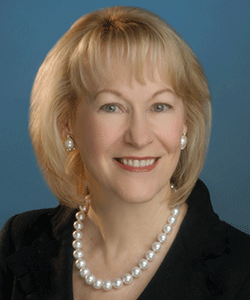Patricia K. Kuhl
 University of Washington
University of Washington
William James Fellow Award
Patricia K. Kuhl is internationally recognized for her research on early language and brain development, and studies that show how young children learn. She is co-director, with her husband Andrew N. Meltzoff, of the University of Washington’s Institute for Learning & Brain Sciences. Kuhl’s lab is using event-related potentials, functional MRI, diffusion tensor imaging, and magnetoencephalography to investigate how infant and adult brains process speech. She has also conducted research on language development in autism, and is particularly interested in the role that the social brain plays in language learning.
Kuhl is widely known for proposing the Native Language Magnet (NLM)/Neural Commitment Theory to account for the developmental change by which infants’ ability to discriminate speech sounds becomes increasingly specific to their native language as they age. This model shows that babies use their computational abilities to “crack” the speech code and that their social skills play an important role in learning. NLM pulls together diverse research interests into a single model that integrates cognitive and auditory processing skills, links between speech perception and production, statistical learning, and social factors that affect learning.
Kuhl’s research has played a major role in identifying critical periods in development. Her work extends to linguistics and education, with applicability to bilingual education and atypical language development in children with autism; to neuroscience; and to engineering in terms of programming computers to respond to spoken language.





APS regularly opens certain online articles for discussion on our website. Effective February 2021, you must be a logged-in APS member to post comments. By posting a comment, you agree to our Community Guidelines and the display of your profile information, including your name and affiliation. Any opinions, findings, conclusions, or recommendations present in article comments are those of the writers and do not necessarily reflect the views of APS or the article’s author. For more information, please see our Community Guidelines.
Please login with your APS account to comment.